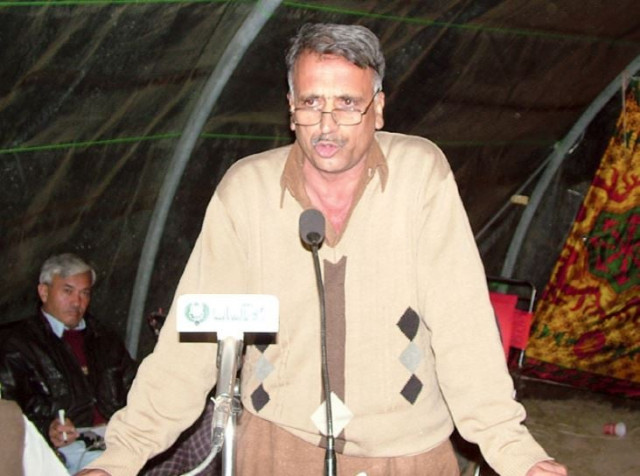Jamshid Khan Dukhi (1956-2022) – a poet of resistance in Gilgit-Baltistan
Jamshid, the 'local Habib Jalib' as he was called, passed away last year on February 21 at the age of 67

Literature enthusiasts mourn the loss of Jamshid Khan Dukhi, a poet whose words continue to captivate and inspire people in Gilgit-Baltistan and beyond.
Born in Gilgit, Jamshid, the 'local Habib Jalib' as he was called, passed away last year on February 21, at the age of 67.
As his first anniversary approaches, the literary figure is missed more than ever, as literary circles call for recognition of his services for the language, and the region.
Noted poet Ghulam Naseem, who has known Jamshid for more than two decades, said in his elegy:
! وہ شخص نہیں، کتاب اُلفت ہے
He is not a person but a book of love!
"Jamshid Khan Dukhi was a true master of local languages," said Amin Zia, a renowned linguist and a long-time colleague of late Dukhi.
Zia added: "Jamshid's poems were a celebration of the region's rich cultural heritage and a testament to the beauty and resilience of the people of Gilgit. But beyond that, his work helped to bring the Sunni and Shia communities closer, promoting a message of unity and understanding."
Famous historian and writer Sherbaz Barcha echoes this sentiment, stating, "Jamshid's poetry was not only a beautiful representation of the region's culture, but it also touched on universal themes that are relevant to all of us. His work will continue to inspire future generations for years to come".
Dukhi, who lost his life to cancer, was not just another poet from Gilgit-Baltistan but a voice of the people, a poet of resistance, a master of the Shina language, a translator, an essayist, a journalist, and a man who promoted the message of love and peace in his progressive poetry.
Dukhi was born in Gilgit in 1956. Growing up in Gilgit, he was inspired by the wisdom of the Shina language. He started poetry in an extempore style. Most of his poetry is in Shina, which was also sung by local artists. He also became part of the Halqa-e-Arbab-e-Zauq-o-Adab in the early 1980s and later served as the president and general secretary of the Halqa.
The society was one of the most prominent literary forums in G-B that promoted Urdu literature and poetry.
Along with Amin Zia and Khaliq Taj as office bearers of the Halqa, Dukhi encouraged writers to use poetry as a medium to build peace in a time of extreme sectarian hostility in the region.
میرے دیہار کی قسمت میں شام لکھا ہے
کبھی فساد کبھی قتل عام لکھا ہے
میں اپنی جان ہتھیلی پر لے کے پھرتا ہوں
نہ جانے کونسی گولی پہ نام لکھا ہے
"My destiny has written evening in its events
Sometimes chaos, sometimes murder is common
I wander with my life in my hand
Not knowing which bullet has my name written on it".
Dukhi’s verses displayed the harshest scenes of sectarian violence in Gilgit. His poetry discussed themes regarding society, politics, culture, nature and, most importantly, the experiences of people in the context of oppression and violence. His poetry recitations in literary gatherings in G-B played a vital role in conflict mediation between the Shia-Sunni communities in G-B. People lauded his criticism of orthodox religious clerics for propagating hatred.
One of his widely quoted couplets is:
تعصب سے بھرا پیغام یہ ہے
بہاؤ خون درس عام یہ ہے
مسلمانوں کا جب انجام یہ ہے
میں کافر ہوں اگر اسلام یہ ہے
"It is a message overflowing with prejudice
Shed blood! Is being commonly preached
When this is the meaning of being Muslim
I am nonbeliever if this is Islam"
Although Dukhi remained critical of religious authoritarianism in G-B, he dedicated many verses to the Holy Prophet (Peace Be Upon Him), God and Hazrat Imam Hussain. He also recited his poems in religious gatherings.
Although there had been many poets before him, Dukhi became both Iqbal and Jalib of G-B. Like Allama Muhammad Iqbal, he addressed injustices faced by people and dreamt about an end to oppression. His dream of putting an end to all sorts of oppression is expressed in his couplet as:
طلوع صبح سے جمشیؔد نا امید نہیں
کہ دور ظلم کے ہوتے ہیں مختصر کوئے
"Jamshid is not hopeless from dawn
That period of oppression is brief, as one knows"
Like Habib Jalib, he was a poet of people and used his poetry for social critique and the construction of a progressive society. Dukhi too was a torch-bearer of resistance and opposed state oppression.
بدل دے خود امیر وقت ورنہ
سبق اقبال کے شاہین دنیگے
نہ بجلی دے سکے آدھی صدی میں
وہ حکم کیا ہمیں آئین دنیگے
"Change on your own, oh ruler of the time
Else the eagles of Iqbal will show you
Those who didn’t give us electricity in half a century
How will those rulers give us constitutional rights"
There is a lot one could say about Dukhi and his poetry. His works, filled with emotion and depth, earned him praise from linguists and scholars alike, who marvelled at his ability to capture the essence of the region in his writing.
He captured the grief and pain of people and yet held the message of love and peace in contrast to his fellow progressive poets whose poems were rather aggressive and rebellious.
Dukhi’s revolutionary poetry holds love and peace as the main elements.
He said:
ہوں کارِ محبت میں ہی مصروف میں اتنا
نفرت کے لئے وقت میرے پاس نہیں ہے۔
I am so busy doing the deeds of love
That I possess no time for hate
He also wrote:
محبت کرنے والوں کو یہ دنیا یاد کرتی ہے
غم دوراں سے بھی انہیں سدا آزاد کرتی ہے
کمی گندم وبجلی کی دکھؔی کب مار دیتی ہے
محبت کی کمی اقوام کو برباد کرتی ہے
On one hand, Dukhi is highlighting the shortage of wheat and electricity in G-B, while on the other hand, he is giving the message of love among nations, as a way towards peace. His poetry is more like a window into the lived experiences of millions of people who have been 'constitution-less' for the last 73 years and are living their lives under extreme conditions. For anyone living under extreme conditions, the perplexity of existence and identity remains complex.
Dukhi pointed out these feelings in a couplet:
سوچ مسبت اگر نہیں آتی
دل میں الفت اتر نہیں آتی
میں ہوں جی بی کا میری تم کو
بے حسی کیا نظر نہیں آتی
Affection doesn't settle in the heart
These complex feelings of perplexity are shared by many people in G-B, Kashmir and elsewhere. Dukhi has documented his love for homeland, and regaining political identity.
Two of his highly known couplets are:
مری دھرتی تو میری آبرو ھے
تیری تصویر پیھم روبرو ھے
شب ظلمت کا ھوگا کب سویرا
اندھیرا ھی اندھیرا چار سو ھے
پتا سسرال کا ھو تو خبر لوں
میری ماں تو بتا کس کی بہو ھے
My land, you are my dignity
Your picture is always in front of me
When will the night of tyranny see the morning
If I knew of the in-laws, I would have asked
Tell me, mother, whose daughter-in-law, are you?
بڑی مشکل سے آزادی ملی ہے
مگر آئین سے خالی ملی ہے
اٹھا کر چن دئیے آئین کے پھل
ہمیں خالی یہاں تھالی ملی ہے!
We have gotten independence with such difficulty
Yet it comes without a constitution
All the fruits of constitution are picked
We have only received an empty bag here
Dukhi’s poetry can be seen as a protest against the political alienation of the region. It resonates with the sentiment of many in Kashmir and Ladakh. His love for Urdu literature and mastery of Shina enabled him to translate many writings of Iqbal into Shina. He was an ambassador of peace and will always be remembered for his work.
Due to lack of advanced tertiary health care in G-B, Dukhi’s last days were spent in Islamabad longing for his beloved homeland and feeling helpless for his people. His loss is still profoundly felt by many who knew him personally, or even the ones who knew him through his poetry. Many of his admirers demand a national award for his remarkable contribution in the field of literature.
Addressing the Islamabad Literature Festival in 2014, Dukhi talked about the insufficient representation of poets, intellectuals, and poetry of G-B in mainstream Pakistan literature festivals.
Unfortunately, it is still the same even after almost a decade. Many have demanded due recognition of Dukhi, Halqa, and other prominent poets and literary movements of Gilgit-Baltistan.



















COMMENTS
Comments are moderated and generally will be posted if they are on-topic and not abusive.
For more information, please see our Comments FAQ